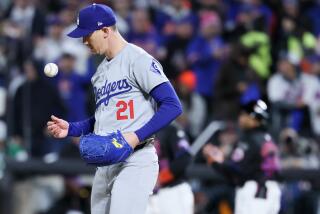Mets Like Pitch of This Viola
- Share via
NEW YORK — The logic of the deal is really quite simple: If your team doesn’t make enough runs to win -- if your most dangerous hitter pops out with the bases full in the eighth inning and you lose by a run -- trade for a pitcher.
So the New York Mets, at the brink of swirling down the drain, got Frank Viola. And it’s a terrific deal for the Mets.
It makes very good sense. If you get better pitching, you don’t need so many runs. If the pitching is good enough, the hitting is good enough. Then the non-production of Darryl Strawberry and Kevin McReynolds isn’t so crippling.
The pitching was supposed to be so broad and so deep that it was invulnerable. The hitting and the defense might falter, as they have, but the pitching would be there. Instead, Mets Manager Davey Johnson identifies the pitching as the biggest disappointment of the season. It was, in his word, a “shambles.” In a seven-game losing streak, nobody was able to stand up and stop it by himself.
Is this deal soon enough or big enough to save this season? I doubt it. But it’s a good deal. Never mind that Mark Langston, acquired by the Montreal Expos from the Seattle Mariners, would have been a better addition; his was a higher price. This deal should have both a ripple effect and chain reaction. That it might be an augur or ogre of the negative effects of free agency -- the big-city teams gobble up the small-city teams -- is another matter and none of the Mets’ concern at this time.
The Mets’ first obligation is to win. That they were able to make a deal for a Cy Young Award pitcher in the prime of life for one journeyman, two prospects and two suspects is a tribute to the Mets’ organization and the magic web they’ve spun around it.
By getting Viola -- considering that he has pitched well lately after a bad start -- the Mets have established a six-deep staff of starting pitchers all younger than 30 except for Bob Ojeda. And Ojeda, 32, appears to be the weakest link.
In the absence of Dwight Gooden, Viola becomes the No. 1 pitcher. That pushes the others back one spot, which is considerable. Ron Darling has been unable to take up Gooden’s burden. Now he doesn’t have to pitch against the best pitchers.
Actually, he becomes No. 3 behind Viola and David Cone. Assuming Gooden recovers from his sore shoulder, then a rotation of Gooden, Viola, Cone, Darling and Sid Fernandez or Ojeda is dazzling.
The presence of Viola made all of those pitchers the Mets gave up superfluous -- even David West, for all his whirlwind potential.
West started twice and came apart both times. That isn’t enough to say that he won’t become a splendid pitcher, but it did suggest that he is still a season away. Players who are a season away may actually be two seasons away, and players who are two seasons away may never arrive. “They all look like stars on paper,” Twins owner Carl Pohlad said. “Their results they’ve had in the minor leagues always look great, but they get up to the majors and something happens. But on the other hand, somebody has to make it, and we think that three of these guys have a good chance to make it.’
Fans think in terms of winning all the time, but the strength of this organization is that it has been willing and able to take a loss when it has to build for the future. The Mets preferred the 29-year-old man who already has demonstrated his big-league skills. Having six starting pitchers also suggests that one or two of them will go for a hitter over the winter.
Johnson thinks the organization is softening on its refusal to join the free-agent market. They wouldn’t jump into the pool and then look to see if it had water as George Steinbrenner and some others have done, but if the Mets could pick up one real hitter, think of what they could be.
Think of the money they could make. Consider that the Mets drew 3,047,724 in attendance last season; they actually sold more like 3.5 million tickets. Winning pays a big return in all the cities, but more in New York. Seattle wasn’t willing or able to pay the price that Langston anticipated as a free agent after this season. The Twins, enriched by attendance of 3,030,672, signed Viola to three years for $7.9 million. Now the Twins have fallen out of contention too early this year to expect to match that attendance.
Pohlad said money had nothing to do with the deal, but I wouldn’t take that at face value. Whatever Pohlad’s personal wealth, the Upper Midwest market doesn’t permit too many mistakes. There was a time when drawing as much as the big cities gave Minnesota or Cincinnati or Oakland the power to match New York or Los Angeles or Chicago.
When Steinbrenner signed his cable contract of $500 million for 12 years, all the old rules were obsolete. He can outbid everybody for a free agent and if he makes another mistake, he can go sign another. The Yankees will get approximately $60 million in local television revenue this year. The Mets with $17 million and the Phillies with $10 million are the next closest. The Twins will get about $4.2 million.
The Mets are now in court trying to overturn provisions of their cable contract. The Mets have seen how much the Yankees are worth. Surely, the Mets aren’t arguing that the Mets are being overpaid, are they?
Oakland has managed to compete by having produced the American League’s last three Rookies of the Year. Rookies come cheap. The Twins have to hope one of those pitchers becomes a Cy Young.
More to Read
Go beyond the scoreboard
Get the latest on L.A.'s teams in the daily Sports Report newsletter.
You may occasionally receive promotional content from the Los Angeles Times.










